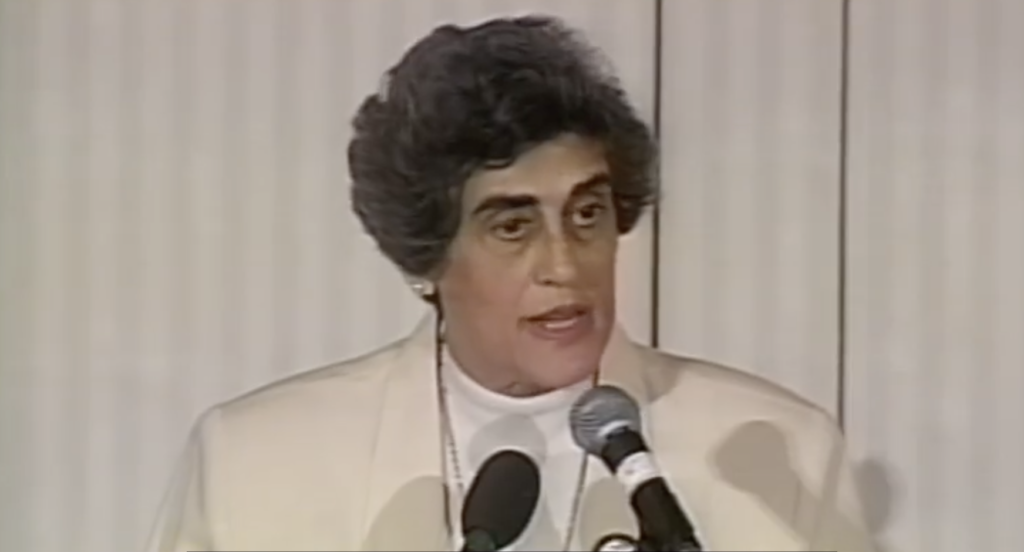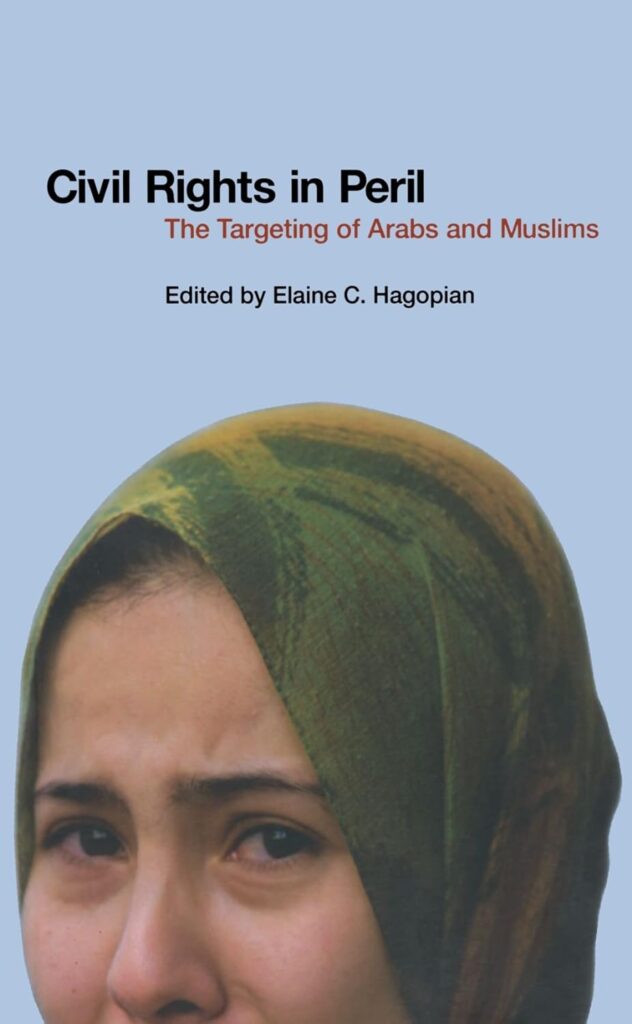Pathbreakers of Arab America—Elaine Hagopian

By: John Mason / Arab America Contributing Writer
This is the forty-eighth of Arab America’s series on American pathbreakers of Arab descent. The series includes personalities from entertainment, business, sports, science, academia, journalism, and politics, among other areas. Our forty-eighth pathbreaker is Elaine Hagopian, a retired Sociology professor at Simmons College in Boston and one of this country’s leading Arab American activists. In 1967 Hagopian joined other Arab American intellectuals in founding the Association of Arab American University Graduates (AAUG), according to Elaine, “to change the way the Arab-Israeli conflict is perceived in the United States.” Her father was an immigrant from Damascus.
Elaine Hagopian, expert on Middle East affairs, preeminent Arab American activist
Elaine Hagopian was an early student of Arab affairs, having learned from her Syrian Arab immigrant father, a grocer. A 1988 interview with Elaine by the Washington Report on Middle East Affairs (WRMEA), described the youngster as getting “her first taste of politics at age eight in a grocery store in Cambridge, MA owned by her father, an illiterate immigrant from Damascus. “He had an incredible passion for learning and young men from our neighborhood used to hang around the store, reading aloud to him from books on politics and law. My father would digest what he heard and then deliver mini-lectures in the store on any number of subjects including Islamic law, superpower competition, and the Palestinian question.”
Following her father’s intellectual footsteps, Elaine developed a vast expertise in Arab and Middle Eastern society and culture. While initially studying to become a secretary, she “had inherited her father’s love of learning” and, at age 17, decided to attend Boston University. Elaine used her secretarial skills to help pay her college tuition. She completed all three degrees, a bachelor’s in 1954, a master’s, and a doctorate in sociology and African Studies.
Elaine began her professional teaching career focusing on the stereotyping of Arabs, first at Smith College, and then at Simmons College. The Six-Day War of 1967 in the Middle East broke out during her first year at Simmons. Elaine reacted to the media’s characterization of Arabs in that war, noting, “The media’s depiction of Arabs as blood-thirsty terrorists resulted in hostility directed against Arab Americans…Arab professors, particularly Palestinians, became increasingly isolated on campus.” In response to such negative views, in 1967, Hagopian wanted to bring some balance to the view most Americans had of the Middle East conflict.
She then joined other Arab American intellectuals in founding the Association of Arab American University Graduates (AAUG) “to change the way the Arab-Israeli conflict is perceived in the United States…The need for a more balanced U.S. policy is a human issue, not just an issue for Arab Americans.”
Over several decades, Hagopian has served as AAUG president, secretary, and five terms on the board of directors. According to the earlier WMREA interview, Elaine, in 1969, co-edited the first AAUG publication, ‘The Arab Americans: Studies in Assimilation.’ The book, which included profiles of Arab American communities from Chicago, Boston, and Springfield, MA, represented a major turning point in Arab American studies.
Hagopian has lectured widely on the Middle East and the developing world in the United States and the Arab world. Again, according to her earlier interview, shortly after Egyptian President Anwar Sadat made his historic trip to Jerusalem, in 1977, Hagopian was one of several prominent Arab Americans invited to the White House by President Carter, who hoped to develop support among Arab Americans for the Sadat initiative. Two years later, she was chosen by UNESCO to develop a specialized guidance and counseling system for a Palestine Open University feasibility study. Planning for the Open University, which was going to be located in Beirut, ended in 1982 when Israel invaded Lebanon.
Hagopian’s changing view on the Middle East—a more radicalized take on Arab and Palestinian rights
Hagopian reported that the Arab American University Graduates Association had modified its position on the Arab-Israeli conflict since the 1970s, when, she said, “it argued in favor of a democratic, secular state for Jews and Palestinians, and for the Arab states too.” But then, “reality hits you in the face,” she said. “Both the Jews and the Palestinians need to go through a period of ‘national identity,’ when they can feel secure in their nation. I would accept the two-state idea (a Palestinian state in the West Bank and Gaza next to Israel) as the minimal solution to the Mideast conflict. Later, when things calm down, Israel, the Palestinian state, and the Arab states may all want to join together in a mutually beneficial economic federation.”
AAUG members and other Arab Americans are not the only ones who appear to be re-evaluating their views on the Arab-Israeli conflict, Hagopian felt. Over the past decades, there appears to have been a major transformation in how the dispute is viewed by some non-Arab Americans. “They’re now more likely to favor a policy which recognizes Palestinian as well as Israeli national rights. And people in the peace movement are starting to realize that to be against nuclear war means dealing with the fact that Israel has a nuclear capability.”
Hagopian devoted much of her career academically and via activism to clarifying the origin of the Israeli-Palestinian conflict. According to the Trans Arab Research Institute, Elaine spent considerable effort in addressing such a basic question as “Why did European Jews want to establish a Jewish state in Palestine.?” She detailed hotly contested issues over the Zionist movement, antisemitism, and a Jewish state in Palestine. Yet another issue that interested Hagopian was what happened to Palestine as a result of the 1948 war, the Palestinian ‘Nakba’ or catastrophe.
Hagopian is a supporter of the Boycott, Divestment, Sanctions (BDS) movement and has accused Israel of conspiring with the United States to establish hegemony in the Middle East. On November 10, 2009, Hagopian published a book review of Northeastern University professor M. Shahid Alam’s, ‘Israeli Exceptionalism: The Destabilizing Logic of Zionism.’

In her review, Hagopian applauded Alam for exposing what she believes to be an Israeli conspiracy to ultimately become “almost invincible in its ability to co-shape U.S. policy in the M.E.” In a Socialist Worker.org article, Hagopian posed many basic questions about U.S.-Israel relations. Cited in that article is her 2004 edited volume, ‘Civil Rights In Peril: The Targeting of Arabs and Muslims.’ The volume addressed questions of how Muslims and Arab Americans came increasingly under attack as a result of the US ‘war on terror’ – at home, as well as abroad.
The review continued, “Since the tragic events of September 11, Arab and Muslim Americans have faced a major assault on their civil liberties. While targeting vulnerable groups and drawing on racist stereotypes about Arabs and Muslims, these measures threaten millions of people, including immigrants, activists, trade unionists, academics, writers, and anyone who the government wishes to define as a ‘threat’ to national security.”
Resulting of 9/11, the Patriot Act and new immigration laws primarily aimed at Muslims and Arabs have greatly expanded federal powers and eroded longstanding civil liberties. Beyond the timeframe of Hagopian’s edited volume was the Trump administration’s ‘Muslim Ban.’ While that is beyond the scope of this article, it lingers as a potential threat to Muslims and Arab Americans generally.
Elaine has gone beyond the call to duty in representing Arab American rights. The results of her work are part of the ideal of an America that embraces all of its people, wherever they hail from, whatever their differences.
Sources:
–“Elaine Hagopian, Personality,” Washington Report on Middle East Affairs, 1/1988,
–“What is the Origin of the Palestinian/Israeli Conflict by Elaine Hagopian,” Trans Arab Research Institute, 6/2/2024
–“Elaine Hagopian,” Canary Mission, 2024
–“Elaine Hagopian on Lebanon’s history of war and resistance, Why the U.S. and Israel wanted this war,” SocialistWorker.org., 8/11/2006
John Mason, Ph.D., focuses on Arab culture, society, and history and is the author of LEFT-HANDED IN AN ISLAMIC WORLD: An Anthropologist’s Journey into the Middle East, New Academia Publishing, 2017. He has taught at the University of Libya, Benghazi, Rennselaer Polytechnic Institute in New York, and the American University in Cairo; John served with the United Nations in Tripoli, Libya, and consulted extensively on socioeconomic and political development for USAID and the World Bank in 65 countries.
The views and opinions expressed in this article are those of the author and do not necessarily reflect the position of Arab America. The reproduction of this article is permissible with proper credit to Arab America and the author.
Check out our Blog here!









